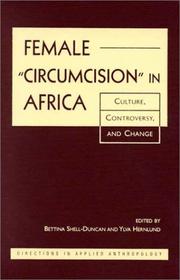
ISBN: 1555878717 Year: 2000 Publisher: Boulder : Lynne Rienner Publishers,
Abstract | Keywords | Export | Availability | Bookmark
 Loading...
Loading...Choose an application
- Reference Manager
- EndNote
- RefWorks (Direct export to RefWorks)
Book
Abstract | Keywords | Export | Availability | Bookmark
 Loading...
Loading...Choose an application
- Reference Manager
- EndNote
- RefWorks (Direct export to RefWorks)
This guide, published by the World Health Organization, aims to equip healthcare providers with person-centered communication skills to prevent female genital mutilation (FGM). It provides training on understanding FGM's cultural context, its health implications, and the ethical challenges associated with medicalized FGM. The manual includes modules for healthcare providers to explore personal values, improve patient communication, and become advocates for FGM prevention. The guide is designed for healthcare professionals engaging with communities where FGM is practiced, and emphasizes the importance of empathy and ethical healthcare practices in influencing positive change.
Book
Abstract | Keywords | Export | Availability | Bookmark
 Loading...
Loading...Choose an application
- Reference Manager
- EndNote
- RefWorks (Direct export to RefWorks)
This publication by the World Health Organization provides ethical guidance for conducting research on female genital mutilation (FGM). It addresses the need for high-quality, ethical research to support efforts in ending this harmful practice, which affects millions of girls and women worldwide. The document outlines ethical principles at various stages of research, including study design, participant safety, informed consent, and dissemination of findings. It emphasizes the importance of respecting participants' rights and minimizing risks associated with research on sensitive topics like FGM. The intended audience includes researchers, policy-makers, and ethics committees involved in FGM-related studies.
Book
Abstract | Keywords | Export | Availability | Bookmark
 Loading...
Loading...Choose an application
- Reference Manager
- EndNote
- RefWorks (Direct export to RefWorks)
This guide, developed by the World Health Organization, provides a comprehensive framework for integrating female genital mutilation (FGM) content into nursing and midwifery curricula. It addresses the gaps in current training by offering a systematic approach to develop context-specific FGM training content. The guide aims to equip health workers with the necessary knowledge and skills for high-quality FGM prevention and care services. It targets curriculum planners and educators tasked with updating or developing nursing and midwifery education programs to include relevant FGM content. The ultimate goal is to improve the provision of care for women and girls at risk of or affected by FGM.
Book
Year: 2010 Publisher: Oslo, Norway : Knowledge Centre for the Health Services at The Norwegian Institute of Public Health (NIPH),
Abstract | Keywords | Export | Availability | Bookmark
 Loading...
Loading...Choose an application
- Reference Manager
- EndNote
- RefWorks (Direct export to RefWorks)
Book
Year: 2022 Publisher: Washington, D.C. : World Bank,
Abstract | Keywords | Export | Availability | Bookmark
 Loading...
Loading...Choose an application
- Reference Manager
- EndNote
- RefWorks (Direct export to RefWorks)
Female Genital Mutilation/Cutting (FGM/C) is a development issue and a form of violence against women and girls that affects at least 200 million women in the world FGM/C is a harmful practice proven to impact the physical and mental health of affected women and girls from the moment of the cutting, with prolonged and irreversible consequences during their entire lives. Studies show that FGM/C has economic and social consequences and a high obstetric cost although a comprehensive study on the exact extent of these economic, health and social costs is still to be carried out. Beyond the data and the statistics, researcher have shown that FGM/C deprives women of sexual satisfaction, sexual health, and psychophysical wellbeing. The Compendium of International and National Legal Frameworks on Female Genital Mutilation (the "Compendium") was prepared to contribute to this urgent and important development debate with the understanding that the knowledge of the law is an important empowerment tool to end FGM/C. It provides a survey of the key international and regional instruments as well as domestic legislation as they relate to the prohibition of FGM/C.
Book
Year: 2004 Publisher: [Washington, D.C.] : The Law Library of Congress, Global Legal Research Directorate,
Abstract | Keywords | Export | Availability | Bookmark
 Loading...
Loading...Choose an application
- Reference Manager
- EndNote
- RefWorks (Direct export to RefWorks)
Year: 2019 Publisher: [Washington, D.C.] : Congressional Research Service,
Abstract | Keywords | Export | Availability | Bookmark
 Loading...
Loading...Choose an application
- Reference Manager
- EndNote
- RefWorks (Direct export to RefWorks)
Book
Year: 2004 Publisher: [Washington, D.C.] : The Law Library of Congress, Global Legal Research Directorate,
Abstract | Keywords | Export | Availability | Bookmark
 Loading...
Loading...Choose an application
- Reference Manager
- EndNote
- RefWorks (Direct export to RefWorks)
Book
Year: 2004 Publisher: [Washington, D.C.] : The Law Library of Congress, Global Legal Research Directorate,
Abstract | Keywords | Export | Availability | Bookmark
 Loading...
Loading...Choose an application
- Reference Manager
- EndNote
- RefWorks (Direct export to RefWorks)

 Search
Search Feedback
Feedback About UniCat
About UniCat  Help
Help News
News